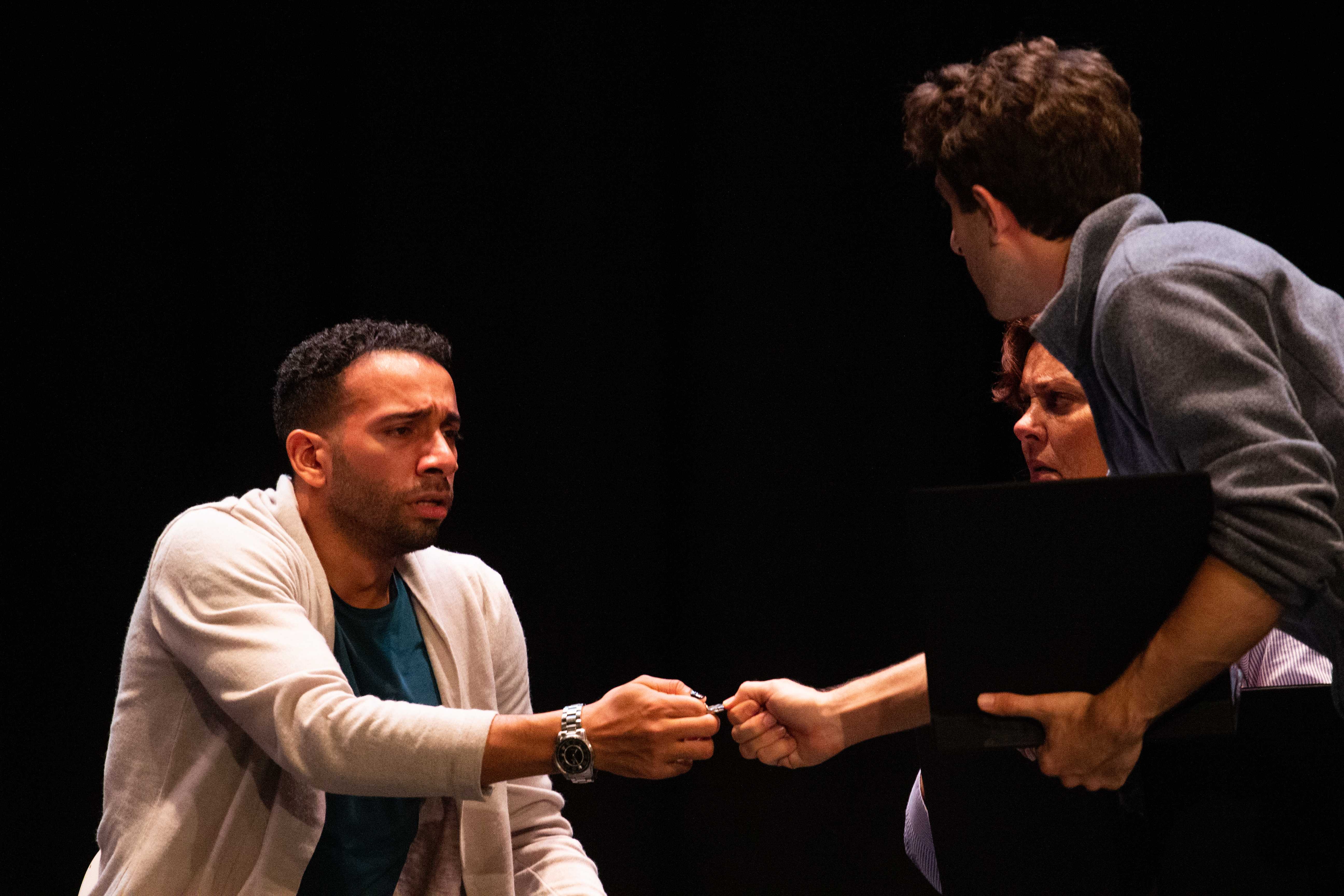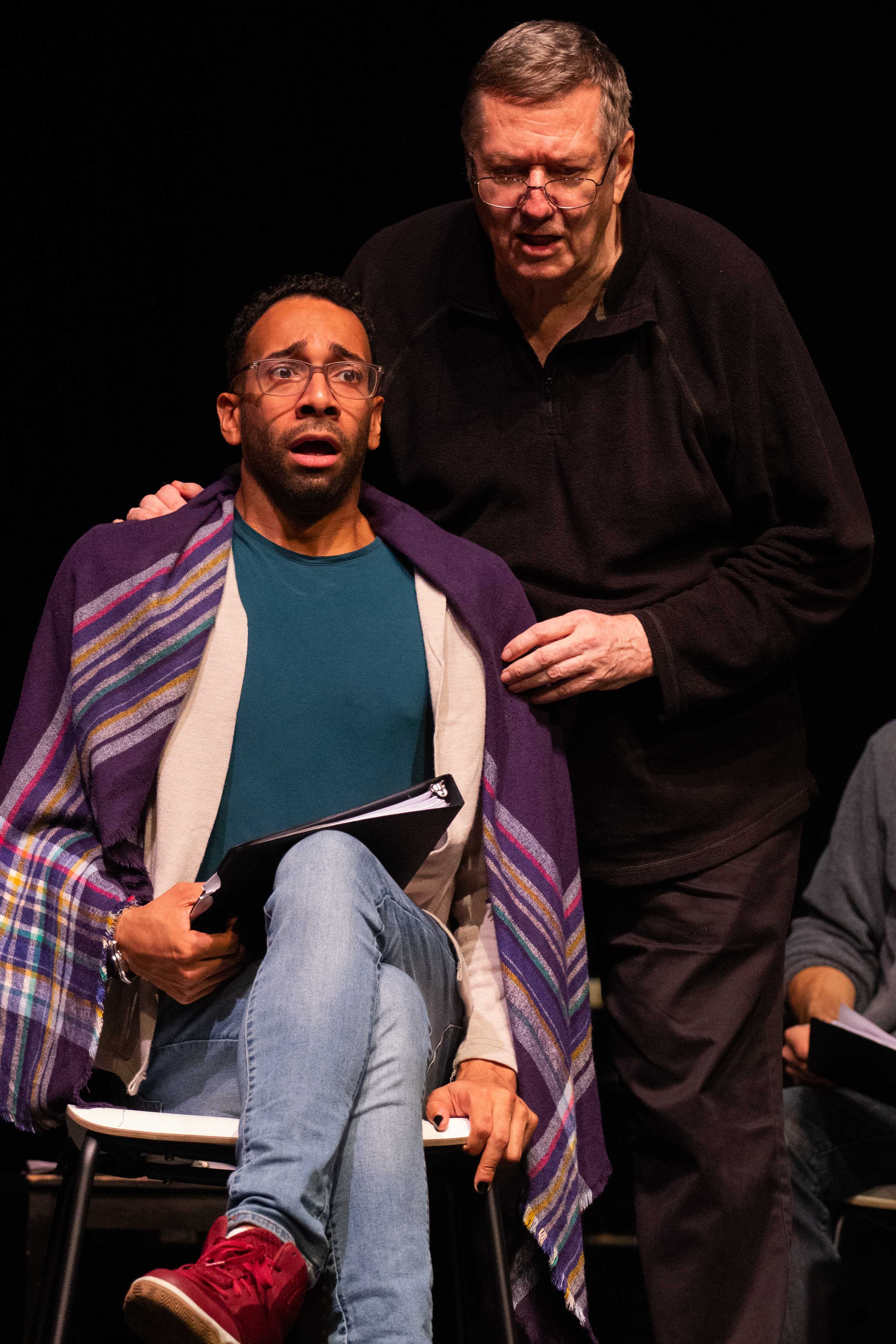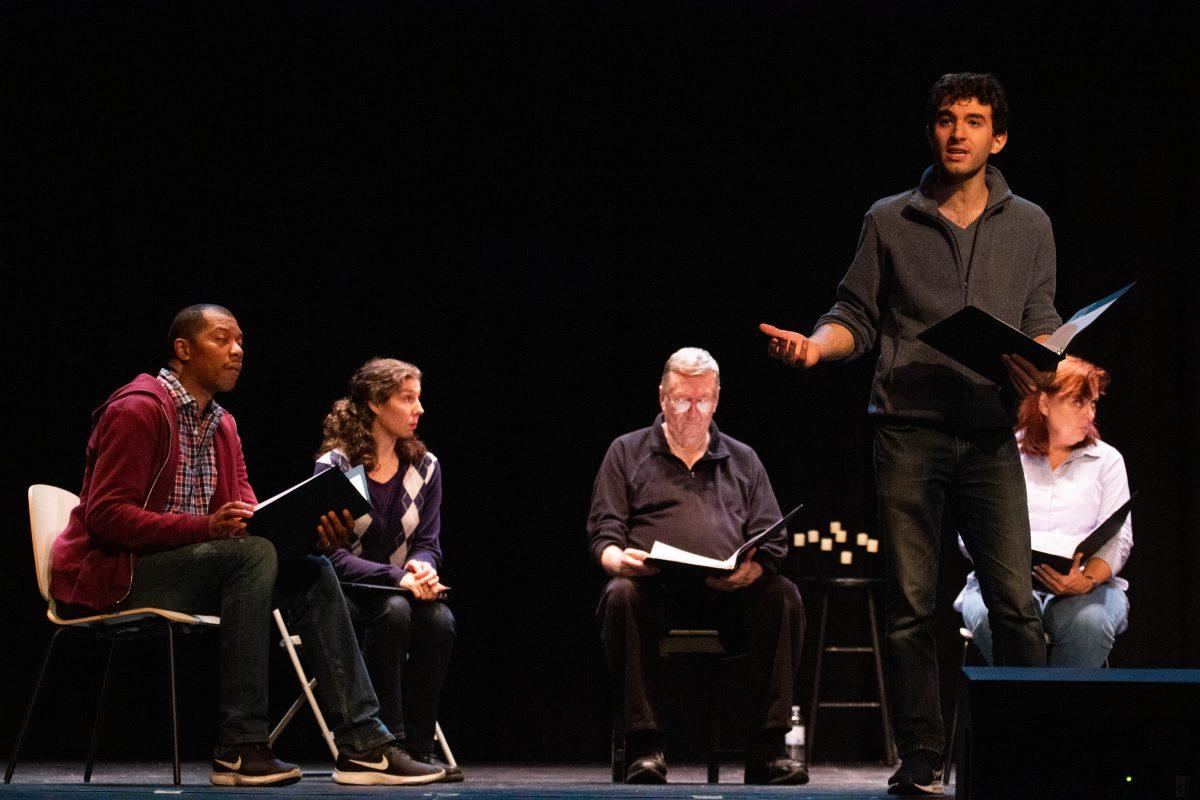Interview-based play explores being LGBT and Catholic
Robert Choiniere and Scott Barrow were approached by Bishop Joseph Sullivan in 2012 and asked to create a play discussing the polarizing topic of being LGBT and Catholic.
After a long process, that proposal turned into “Full of Grace: Journeys of LGBT Catholics,” an accumulation of interviews with diverse individuals from across the country who are trying to reconcile their faith and sexual identity.
This play was brought to the Bluett Theatre at St. Joe’s on Nov. 1 and 2, sponsored by the Faith-Justice Institute.
Choiniere and Barrow, co-founders of the educational theatre company Stages on the Sound, previously worked on another interview-based play called “Crossings,” which focused on immigration. Their work with that production is what sparked Sullivan’s idea.
The purpose of the performance is to shed light on the variety of perspectives on the issue of sexuality and Catholicism, according to Choiniere, creator of “Full of Grace.”
“We wanted to make sure we represented people on both sides of the issue in a way that they could stand on stage and have a conversation or even an argument with each other in some ways,” Choiniere said. “They weren’t really dialogues, but if you put them together, it actually becomes a conversation.”
The play is structured as various dialogues connecting different stories to highlight themes such as scriptural interpretations of homosexuality, coming out stories, familial relationships and the overarching meaning of God’s love.

The six-person cast portrayed over 30 voices, representing clergy, parents of LGBT children, teenagers, transgender individuals and a variety of perspectives on all sides of the debate.
“We wanted to make sure we had a diversity of voices, so we kept asking ourselves the questions, ‘Do we have everybody? Whose voice is not here yet?’” Choiniere said.
Giving a voice to a marginalized group was the main reason the Faith-Justice Institute became interested in hosting “Full of Grace,” according to Annie Bole, lectures and programming assistant.
The Faith-Justice Institute has used the Joseph William and Madeline Eberle Klein Fund for the last three years to run events related to the exclusion of certain groups within the Catholic Church.
“It’s a way to promote discussion and dialogue around those issues and groups that haven’t always had a voice in the Catholic Church or who have felt marginalized in some way and not given a seat at the table,” Bole said.
The fund is meant to serve students and the issues that are directly affecting them.
“It definitely lets students know that the university is supportive of the LGBT community,” Bole said. “Students probably wouldn’t have the opportunity to see something like this elsewhere, so it really brings something directly to the campus community.”
The play was open to the public, allowing students, faculty and members of the surrounding community to be exposed to the conversation. That conversation, rooted in real experience, is one that Choiniere said is lacking in other religious spaces.
“According to Catholic sexual ethics, there’s no space for same-sex sexual activity ever,” Choiniere said. “The question that people have is ‘how do you live a fulfilling life if you find yourself that you possess this sexual identity, but you can never ever act on it?’”
“Full of Grace” explored questions such as this one through reciting word-for-word the interviews that Choiniere and his team conducted.
“It’s rooted in experience,” Choiniere said. “Let’s listen to people’s stories first, and then let’s ask the question of what is God doing here. That’s not how this issue has ever been treated.”
Through the wide range of experiences shared, Choiniere said he hopes to demonstrate that everyone’s story is different and that trying to force individuals into a box is an act of violence.
Church teaching plays a major role in this discussion, as many of the stories touched on the struggles between sexual identity and religious identity.
“We let the teaching have its place in the show, and I hate to say it, but it becomes a villain,” Choiniere said. “It’s not because we adulterate it at all. It’s the way it’s written.”
The intention of the creators, however, is not to condemn the Church, but rather to discuss something other than the Church.
“Instead of saying ‘here’s church teaching, let’s talk about it,’ how about we say, ‘here are the lives of people, let’s talk about it,’” Choiniere said.
One of the storylines the play follows is, Margie Winters, a former religion teacher at Waldron Mercy Academy, who is fired when a parent at her school finds out she is married to another woman. Other stories include those of priests and nuns who discuss their sexuality after becoming ordained. These can be hard to hear for anyone familiar with Catholic teaching, Choiniere said.
For Jordon Finkelstein ’22, the play forced her to think about issues she had never considered before.
“It highlights a different side of the church and the people in the church that most people don’t really think about,” Finkelstein said. “If you assume someone’s LGBT, you kind of assume that they’re not part of the Church.”
The most shocking part for Finkelstein was to hear the testimonies of the clergy.

“I think the priests’ stories really surprised me,” Finkelstein said. “You don’t think of them being in relationships at all, so to hear that priests are in gay relationships, I just wasn’t expecting that.”
Choiniere said those stories are typically the most difficult for people to hear, but they still need to be part of the discussion.
“The idea is, if you walk out and say, ‘oh that was so wonderful’ and you’re not challenged at all, then I don’t feel like I’ve really done my job,” Choiniere said.
Choiniere sought to achieve that by including stories that not only appeal to allies and LGBT individuals, but also stories that make them see how far the Church still needs to go.
“Because it’s nonfiction and my only goal is to create a platform where people’s stories can be heard, it takes that pressure off,” Choiniere said. “My agenda is to take other people’s stories and let that impact other people.”
As a Catholic and a professor of theology at Fordham University, Choiniere wants to create a more tolerant atmosphere that is still compatible with the faith. His method is to meet Catholics where they are rather than force them to adhere to the doctrinal standard.
“This is where theology needs to be,” Choiniere said. “It needs to be engaging people in their lives.”















































